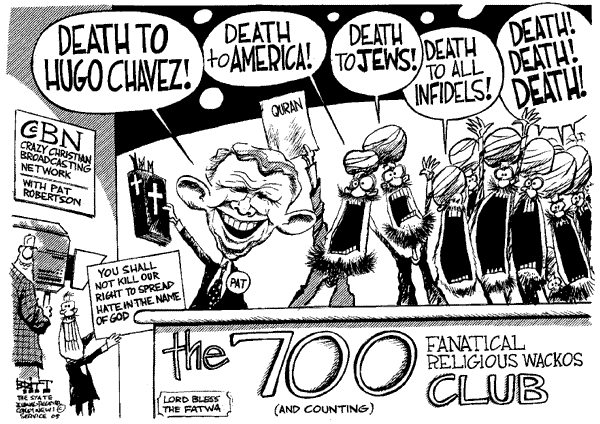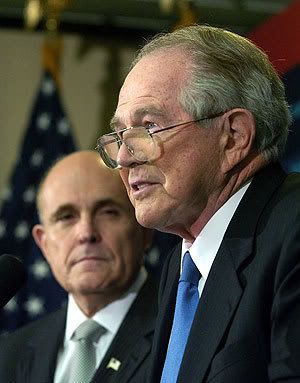“The Lord had some very encouraging news for George Bush. What I heard [from God] was that Bush is now positioned to have victory after victory and that his second term is going to be one of triumph, which is pretty strong stuff.”
That wonderfully incorrect prediction is from Pat Robertson. You might remember him as the guy who called for the assassination of democratically elected president of Venezuela Hugo Chavez, an action that, as the cartoon points out, puts him in league with terrorists. He is a, televangelist, ex-presidential candidate, and perhaps the worst prophet in the history of man, and today he endorsed Rudy Giuliani.
“Why do I care?” you ask. Allow me to explain…
This move could throw the evangelical movement into uncharacteristic disunity, and could even mark the beginning of the end of the Christian Right. You see, the Christian right has built its political power on the backs of its believers. They have been able to have a significant effect on politics because evangelical leaders have been able to mobilize their parish.
This mobilization is often accomplished by tapping into the parishioner’s common religious beliefs. Pastors and Priests link religious dogma, such as “Thou shall not kill” to selected political issues, like the national debate on abortion.
Pat Robertson’s endorsement of Rudy Giuliani, who is pro-abortion, quad-divorced, and pro-gay rights, ensures that voters will not be able to link their presidential vote to religious belief. This raises two interesting questions: If Pat Robertson didn’t choose Rudy based on theological grounds on what grounds did he choose him? And, Will religious voters be motivated to vote when doing so would require them voting against their religious values?
The answer to the first question is obvious. The religious right wants power and their leaders are going to line up being the candidate they think will win. Giving the winning candidate votes now, buys them influence later.
The second question is a little more tough. In the past, republican strategists haven’t been completely confident when voters didn’t have a direct religious reason to vote for a candidate, in 2004 despite George W. Bush’s perceived religiosity, the GOP put 11 same-sex marriage bans on state ballots to bring out the religious voters. Will they be able to do the same thing in 2008? We’ll have to wait and see.
.jpg)


No comments:
Post a Comment